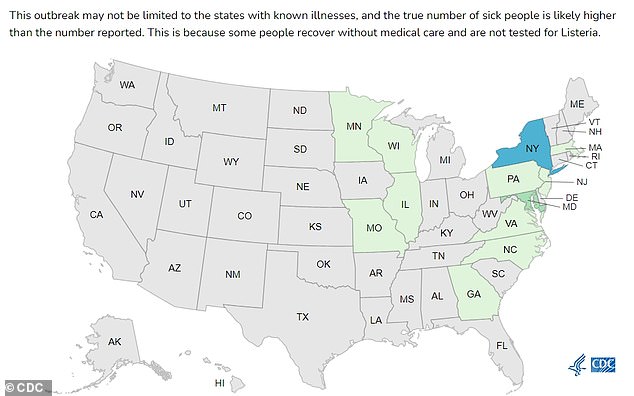Two dead, 34 sick after listeria outbreak linked to recalled Boar’s Head deli meat
A multi-state listeria outbreak linked to contaminated deli meats has sickened at least 34 people and killed two, prompting a massive recall.
Long-standing supermarket chain Boar’s Head sources 100 tonnes (207,000 pounds) of meat from delis across the country.
Research has shown that traces of the bacteria were found in liverwurst samples. These had also been processed with other types of meat, which could have led to cross-contamination.
Listeria infection, also called listeriosis, can be fatal, especially for pregnant women, unborn babies, the elderly, and people with weakened immune systems.
A sample of Boar’s Head liverwurst tested positive for listeria. The liverwurst was processed with other meats such as turkey, leading to a massive recall of over 200,000 pounds of meat
Symptoms range from fever, chills and nausea to headache, stiff neck and convulsions.
All but one of the 34 illnesses required hospitalization. The CDC claims the outbreak is likely much larger than its investigation has shown, as some people will recover without medical care or testing for listeria.
The U.S. Department of Agriculture (USDA) food safety regulators released an update on the number of cases earlier Friday in an announcement of a large-scale recall of Boar’s Head, which will affect all major grocery chains in the U.S.
According to the U.S. Department of Agriculture (USDA), the outbreak has so far affected at least 13 states, while the CDC names only 12: Georgia, Illinois, Massachusetts, Maryland, Minnesota, Missouri, New York, New Jersey, North Carolina, Pennsylvania, Virginia and Wisconsin.
The USDA Food Safety and Inspection Service said: ‘The problem was discovered when FSIS was notified that a sample collected by the Maryland Department of Health tested positive for L. monocytogenes.
‘The Maryland Department of Health, in collaboration with the Baltimore City Department of Health, retrieved an unopened liverwurst product from a retail store for testing as part of an investigation into an outbreak of L. monocytogenes infections.’
CDC researchers began taking samples from sick patients on May 28 and conducting interviews about the foods they ate in the month before they got sick.
Of the 18 people CDC officials were able to interview, 16 reported eating meat that had been sliced in a deli. The most common were turkey, liverwurst and ham.
The bacteria can spread from surface to surface, from meats to cutting tools to countertops, so health authorities are urging people to sanitize all surfaces in their kitchens and the inside of their refrigerators.
About 1,600 people get sick with listeriosis each year, and about 260 die. Eating improperly processed meats and drinking unpasteurized milk that carries the bacteria is the primary cause of infection.

Listeriosis cases have been confirmed in 12 states. Two people have died — one in New Jersey and another in Illinois. The CDC believes the outbreak is likely larger than what officials have recorded
Healthy people are at lower risk of serious, life-threatening diseases than older people and pregnant women.
Pregnant women are ten times more likely to get listeriosis than other adults. They are particularly susceptible to the disease because of changes in the immune system during pregnancy. This makes it easier for infections to take hold and makes it harder for the body to fight them off.
When a pregnant woman becomes infected, the bacteria travel to the fetus. When that happens, it can cause widespread infection in the fetus, which can lead to premature birth, miscarriage, or stillbirth.
Symptoms may appear quickly or as late as 10 weeks after exposure to the bacteria in contaminated food.
If it spreads to the nervous system, listeria can also cause severe encephalitis, blood poisoning, convulsions and brain swelling. Early diagnosis and treatment with antibiotics is crucial to prevent the worst possible outcome.
This isn’t the only listeria-related recall announced this year. Earlier this month, Ohio-based Wiers Farm Inc. voluntarily said that some of its whole and packaged salad cucumbers sold at certain Walmarts in Michigan, Indiana and Ohio may have been compromised.
The recall includes green beans, bell peppers, zucchini, jalapeños and more. The recall has been expanded to include green beans and jalapeños sold under the Freshire Farms brand, an Aldi brand.
A total of 27 products were affected, some of which were sold individually or in bulk at Walmart, Krogers and Save-a-Lots across the country.
